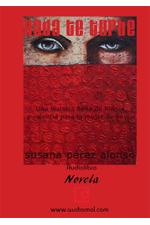Blog del Instituto Cervantes de Dublín
Torre Martello
Audiolibro de la semana | Audiobook of the Week: Nada te turbe
El audiolibro de esta semana es uno de los éxitos más inesperados de los últimos años. Se trata de Nada te turbe de Susana Pérez-Alonso. Para descargarte esta historia que te enganchará desde el primer momento solo necesitas dos cosas: tu carnet de la biblioteca y hacer click aquí.
“Nada te turbe” es el propósito que una mañana se hace Catalina Béjar de Prado. Ella, Catalina y sus amigas son las protagonistas de esta novela. Catalina Béjar de Prado es una mujer progresista hasta donde le conviene. Catalina Béjar de Prado se casó con un “igual”, eso es lo que ella creía. En el fondo, Catalina se casó para escapar. Nunca supo de qué tenía que escapar, pero ese fue su propósito. Ahora, en la cuarentena, Catalina se nota permanentemente turbada y no escatima esfuerzos para dejar de estar así. El problema es su casa, su hija, su marido, su trabajo, su madre, su hermana, sus amigas, el amante, la mujer del amante, la política, la globalización, la anorexia, los gimnasios, el magnesio…
The audiobook of the week was one of the most unexpected successes of the last few years. It´s the novel Nada te turbe by Susana Pérez-Alonso. To download this engaging story you just need two things: your library card and make click here.
“Let nothing disturb you” is the resolution made one morning by Catalina Béjar de Prado. Catalina and her friends are the main characters of this novel. Catalina Béjar de Prado is a liberal woman to a certain point. She got married to someone “like her”, that´s what she thought. Deep down, Catalina got married in order to escape. She never knew exactly what she was escaping from but that was the purpose. Now that she is in her forties Catalina finds herself permanently distraught and she spares no effort to stop feeling like that. The problem is her home, her daughter, her husband, her job, her mother, her sister, her friends, her lover, her lover´s wife, politics, globalization, anorexia, gyms, magnesium…
Audiolibro de la semana | Audiobook of the Week: El huésped
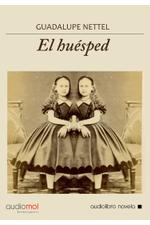 El audiolibro de la semana es una de las propuestas más interesantes de la literatura mexicana reciente: El huésped de Guadalupe Nettel. Para descargarte esta historia fascinante necesitas la tarjeta de la biblioteca y hacer click aquí.
El audiolibro de la semana es una de las propuestas más interesantes de la literatura mexicana reciente: El huésped de Guadalupe Nettel. Para descargarte esta historia fascinante necesitas la tarjeta de la biblioteca y hacer click aquí.
La extraña historia de una niña habitada interiormente por un ser inquietante, quizás imaginario, quizás no. Ana sostiene una lucha silenciosa contra esa hermana siamesa, hasta que el huésped comienza a manifestarse en su entorno familiar de una manera devastadora.
Alrededor de esa presencia se fraguan los acontecimientos de una vida, entre ellos las tragedias familiares, su existencia como adulta. Los personajes, incluida la ciudad, se desdoblan en una confusión de reflejos, se mueven entre lo superficial y lo profundo, sin que sepamos nunca el territorio que pisamos. También describe la cara subterránea de la ciudad de México.
Son personas que no encuentran un lugar en el mundo y se organizan en grupos paralelos que imponen sus propios valores y que comprenden su rara belleza. La autora explora estos universos guiada por una intuición: en los aspectos que nos negamos a ver del mundo -o de nosotros mismos- se esconden las pautas que nos ayudan a sobrellevar la existencia.
The audiobook of the week is one of the most interesting novels of recent Mexican narrative: El huésped by Guadalupe Nettel. If you wish to download this fascinating story you need your library card and make click here.
This is the strange story of a girl who has a disturbing living being inside her, maybe imaginary, maybe not. Ana has a silent fight with her “Siamese sister” until it starts to act in her home environment in a devastating way.
Life, family tragedies and her existence as an adult evolve around this living being. The characters, including the city, are divided in a confusion of reflections and move between the superficial and the profound. We never know the territory where we are stepping. It is also described the subterranean side of Mexico DF.
These are people who are not able to find a place in the world and they organize each other in parallel groups who understand their rare beauty and have their own values. The author explores these universes guided for an intuition: the clues that help us to bear our existence lie in the aspects of the world or of ourselves that we don´t want to see.
Audiolibro de la semana | Audiobook of the Week: Asuntos propios
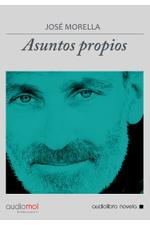 Asuntos propios de José Morella es el audiolibro propuesto esta semana. Descargarlo es tan fácil como coger tu carnet de biblioteca y hacer click aquí.
Asuntos propios de José Morella es el audiolibro propuesto esta semana. Descargarlo es tan fácil como coger tu carnet de biblioteca y hacer click aquí.
Roberto es un hombre acostumbrado a hacer lo que le da la gana. Un hombre independiente. Se jubiló hace seis años, pero, a sus setenta y un años, sigue traduciendo. Y cada mañana se sienta delante del ordenador, y traduce durante horas. La señora Dolores, la portera, sube a limpiar el piso un par de veces por semana pero cuando sufre una embolia y ya no puede volver a trabajar, Isabel, la hija de Roberto, insiste en que su padre pida una asistenta.
Un lunes, Jacinta llama a la puerta. Su belleza y su carácter impresionan a Roberto, y enseguida surge algo entre ellos. Entre esa mujer, que sabe que siempre será una extranjera que genera una sorda desconfianza entre los locales, y ese hombre culto, aún ávido de vida, surge una relación que subvierte sus vidas y las de los que les rodean.
Porque su goce suscita odios y revela prejuicios que nadie cree tener, pone en cuestión el limbo terrible al que los hijos condenan a los padres, los jóvenes a los viejos, los iguales a los diferentes. Una elegante, sagaz fábula de la cotidianeidad, llena de inesperadas facetas a descubrir.
This week we suggest you Asuntos propios by José Morella. Downloading this audiobook is as easy as taking you library card and making click here.
Roberto is someone who is used to do whatever he wants. An independent man. He´s been retired for six years but even though he´s 71 years old, he still translates every day for hours.
Ms Dolores, the caretaker, cleans up his apartment twice a week but when he suffers an embolism and cannot work anymore, Isabel, Roberto´s daughter, wants his father to get someone who looks after him.
One day, Jacinta knocks on the door. Her beauty and personality impress Roberto and there is an instant connection between them. A relationship is born between Jacinta, who knows that she always will be a foreigner and locals won´t trust her, and Roberto who is an educated man, still eager for life. This relationship changes their lives and the lives of those who surround them.
Their joy arouses hatred and reveals prejudices that everybody thinks they don´t have. It calls into question the terrible limbo where children condemn their parents, young people to old people,similar people to different people. This is an elegant, sharp fable of everyday life, full of unexpected sides to discover.
Autor del mes | Author of the month: Luis Alberto de Cuenca
Luis Alberto de Cuenca es nuestro autor seleccionado para los meses de diciembre y enero. Nació en Madrid en 1950 y es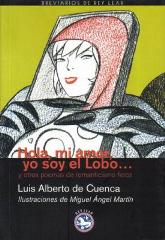 autor de una numerosa producción como poeta, traductor y ensayista. Empezó la carrera de Derecho pero pronto la abandonó para licenciarse en Filología Clásica. Posteriormente obtuvo el doctorado y ha ocupado cargos tan destacados como el de Secretario de Estado de Cultura y director de la Biblioteca Nacional.
autor de una numerosa producción como poeta, traductor y ensayista. Empezó la carrera de Derecho pero pronto la abandonó para licenciarse en Filología Clásica. Posteriormente obtuvo el doctorado y ha ocupado cargos tan destacados como el de Secretario de Estado de Cultura y director de la Biblioteca Nacional.
Es uno de los poetas contemporáneos más destacados del panorama nacional, alternando formas clásicas y modernas dentro de un estilo muy personal que le ha valido el reconocimiento de la crítica especializada. Su obra poética se inicia en 1971 con Los retratos y prosigue con Elsinore, Scholia y Necrofilia, en la línea de la poesía culturalista.
La ironía, el lenguaje coloquial, el distanciamiento, o la mezcla de lo cotidiano y lo irreal, son rasgos perceptibles a partir de La caja de plata, que obtuvo el Premio de la Crítica en 1986.
Luis Alberto de Cuenca is the author of the month in December and January. He was born in Madrid in 1950 and is the author of a vast production as poet, translator and essayist. He started to study Law but soon he dropped out and he graduated in Classical Philology. He later obtained a PhD and he was Estate Secretary of the Ministry of Culture and Director of the National Library.
He is one of the most remarkable poets in the national scene, combining classic and modern forms. His unique style has received critical recognition. His poetic work started in 1971 with Los retratos and continued with Elsinore,Scholia and Necrofilia, which are part of the so called Culturalist Poetry.
Irony, colloquial language, distancing, the everyday and the transcendental intermingling are elements of his poems since La caja de plata which won the Critics Award in 1986.
Novedades en la biblioteca: diciembre 2012, enero 2013 / New to the library: December 2012, January 2013
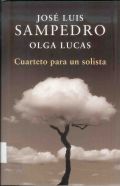 Las novedades de la biblioteca pueden ser consultadas en nuestro catálogo en línea, como es habitual.
Las novedades de la biblioteca pueden ser consultadas en nuestro catálogo en línea, como es habitual.
Para ello, seleccione ÚLTIMAS ADQUISICIONES y elija el período de tiempo que le interesa: ”el último mes” o “los últimos tres meses”.
Ésta es nuestra selección para los meses de diciembre de 2012 y enero de 2013.
The lastest additions to the library catalogue can be consulted on line as usual.
Click ÚLTIMAS ADQUISICIONES and choose the time period: “el último mes” or “los tres últimos
meses”.
This is our selection for December 2012 and January 2013.
Audiolibro de la semana | Audiobook of the Week: El caldero de oro
El audiolibro que te proponemos esta semana es El caldero de oro de José María Merino. Si deseas descargártelo, solo necesitas dos cosas: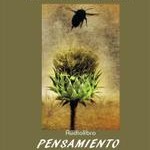 tener a mano tu carnet de biblioteca y hacer click aquí.
tener a mano tu carnet de biblioteca y hacer click aquí.
Es esta novela, el relato de un tiempo mítico que reúne en sí el pasado y el presente, marcado por las invasiones y los olvidos, origen y testigo de las vidas de quienes lo poblaron desde su principio. El caldero de oro será el símbolo de las estirpes que vivieron junto al río milenario, leyenda fundacional, símbolo insoslayable de la infancia de un protagonista que, un día, regresará al pueblo de sus antepasados, abandonado y solitario, para encontrase con un destino encerrado en su propia historia.
Narrada desde la memoria y la imaginación sustentada en un lenguaje que no olvida nunca su condición reveladora, El caldero de oro es una de las obras que evidencian la renovada vitalidad de la literatura española.
The audiobook of this week is El caldero de oro by José María Merino. If you wish to download it, you just need to follow two steps: take your library card and make click here.
This is a story about a mythical time that links past and present, a time marked by invasions and obscurity that is origin and witness of the lives who inhabited it since the beginning. The golden caldron is symbol of the lineage that lived next to the thousand-year-old river. It´s the original legend, the inescapable symbol of the main character´s childhood who one day comes back to the abandoned and lonely village where his ancestors lived to meet a destiny locked in its own history.
This story is told from the memory and imagination and it´s nurtured by a language that never forgets its revealing condition. El caldero de oro is one of the novels that show the renewed vitality of Spanish literature.
Audiolibro de la semana | Audiobook of the Week: Los girasoles ciegos
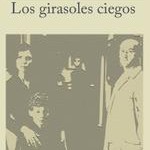 Esta semana te traemos en forma de audiolibro uno de los libros más reconocidos en la literatura española reciente: Los girasoles ciegos de Alberto Méndez. Para descargar esta gran novela, solamente necesitas tu carnet de la biblioteca y hacer click aquí.
Esta semana te traemos en forma de audiolibro uno de los libros más reconocidos en la literatura española reciente: Los girasoles ciegos de Alberto Méndez. Para descargar esta gran novela, solamente necesitas tu carnet de la biblioteca y hacer click aquí.
Un capitán del ejército de Franco que, el mismo día de la victoria, renuncia a ganar la guerra; un niño poeta que huye asustado con su compañera niña embarazada y vive una historia vertiginosa de madurez y muerte en el breve plazo de unos meses; un preso en la cárcel de Porlier que se niega a vivir en la impostura para que el verdugo pueda ser calificado de verdugo; por último, un diácono rijoso que enmascara su lascivia tras el fascismo apostólico que reclama la sangre purificadora del vencido.
Son historias de los tiempos del silencio, cuando daba miedo que alguien supiera que sabías. Cuatro historias, sutilmente engarzadas entre sí, contadas desde el mismo lenguaje pero con los estilos propios de narradores distintos que van perfilando la verdadera protagonista de esta narración: la derrota. Premio Nacional de Literatura 2005, Premio de la Crítica 2005, Premio Setenil 2004.
This week we bring you the audiobook of one of the most remarkable novels of recent Spanish literature: Los girasoles ciegos by Alberto Méndez. If you want to download this great novel, you just need your library card and make click here.
A captain who is on Franco´s side renounces to win the war on the very same day of the victory; a young poet runs away with his pregnant young partner and lives a vertiginous story of maturity and death in a brief period of time; a prisoner of the Porlier jail refuses to live a lie in order the executioner can be called executioner; finally, a lecherous deacon hides his lust behind the apostolic fascism that claims for the purifier blood of the defeated.
These are stories about those times of silence when you were scared that someone knew that you knew. Four stories subtly connected, narrated with the same language but with the different styles used by the narrators that shape the real protagonist of the novel: defeat. National Award of Literature 2005, Critics Award 2005, Setenil Award 2004.
Nuevo horario de biblioteca / New library opening hours
 Debido a circunstancias imprevistas, nos hemos visto obligados a cambiar el horario de biblioteca.
Debido a circunstancias imprevistas, nos hemos visto obligados a cambiar el horario de biblioteca.
Con este nuevo horario, intentamos adaptarnos de la mejor forma posible a vuestra demanda, teniendo en cuenta los recursos de los que disponemos.
En todo caso, la biblioteca seguirá teniendo un amplio horario de apertura, de lunes a sábado. También tenéis a vuestra disposición, las 24 horas, los siete días de la semana, nuestros servicios en línea: diccionarios y bases de datos, audiolibros, y libros electrónicos.
El horario queda como sigue:
Lunes a jueves: 11.30h a 18.30h
Viernes y sábado: 9.30h a 14.00h
¡Nos vemos en la biblioteca!
Due to unforeseen circumstances, our library opening hours are changing from today until further notice:
Monday to Thursday: 11:30am-6.30pm
Friday and Saturday: 9.30am-2pm
We are sorry for any inconvenience caused. Please remember that all our members have access, 24 hours a day, 7 days a week to our online services, such as: online dictionaries and data bases, audiobooks and electronic books.
See you in the library!
Audiolibro de la semana | Audiobook of the Week: Y no vuelvas más por aquí
 Nuestra recomendación de la semana es el audiolibro Y no vuelvas más por aquí de Pedro Menchén. Si deseas descargarte esta historia, tan solo necesitas tener a mano tu tarjeta de la biblioteca y hacer click aquí.
Nuestra recomendación de la semana es el audiolibro Y no vuelvas más por aquí de Pedro Menchén. Si deseas descargarte esta historia, tan solo necesitas tener a mano tu tarjeta de la biblioteca y hacer click aquí.
Se trata de un entretenido y original thriller con dos personajes atípicos: un joven gay y un sicario colombiano, reunidos por azar y obligados a enfrentarse a sus propios demonios internos. El joven no puede evitar sentir atracción por el sicario a pesar de los miedos que le provoca. El joven se lanzará de lleno a una aventura de la que no conoce el final sólo por el placer de estar cerca de su amante. El cuerpo se lo pide. No te la pierdas. Esta novela negra te captura en su red desde la primera página.
Our recommendation for this week is the audiobook Y no vuelvas más por aquí by Pedro Menchén. If you wish to download this story, you only need to get your library card and make click here.
This is an entertaining and original thriller about two atypical characters: a young homosexual and a Colombian hit man who meet by chance and are obliged to face their own internal demons. The young man can´t avoid feeling attracted to the hit man despite also feeling scared of him. The young one will embark on an uncertain adventure only for the pleasure of being close to his lover. That´s what his body wants. Do no miss it. This black novel will engage you from the very first page.
Audiolibro de la semana | Audiobook of the Week: El balneario
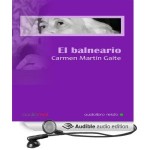 Esta semana te proponemos conocer esta colección de relatos de la gran escritora Carmen Martín Gaite a través del audiolibro El balneario.
Esta semana te proponemos conocer esta colección de relatos de la gran escritora Carmen Martín Gaite a través del audiolibro El balneario.
El balneario es el título de la novela corta que da título a esta colección. Escrita en 1953, la autora consiguió el Premio Café Gijón en 1954. Ya sabes que para descargar el audiolibro solo necesitas tu tarjeta de la biblioteca y hacer click aquí.
Se compone de diez magistrales relatos en los que se predomina una atmósfera onírica y opresiva en la que se mezclan sueños y realidad. El argumento de su historia principal es bastante sencillo. Matilde Gil de Olarreta llega junto a Carlos, probablemente su amante, a un balneario, donde son recibidos por los demás veraneantes de un modo hostil y misterioso.
This week we suggest that you enjoy El balnerario using our audiobook download service. It is a collection of short stories written by the great writer Carmen Martín Gaite.
El balneario is the title of the short novel that provides the title of this book. It was written in 1953 and won the Café Gijón Award in 1954. As you already know, you only need your library card and make click here to download the book.
The book consists of ten brilliant short stories. There is a common oniric atmosphere in most of them, mixing dreams and reality. The plot of the main story is fairly simple. Matilde Gil de Olarreta arrives with Carlos (probably her lover) to a resort where they receive a hostile and mysterious welcome from the other guests.
Audiolibro de la semana | Audiobook of the Week: Esta noche moriré
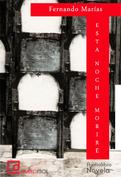 Con un inicio tan enigmático como “me suicidé hace dieciséis años”, Fernando Marías escribe una inquietante novela que te atrapará desde el primer momento. ¿Quieres escucharla en forma de audiolibro? Coge tu carnet de la biblioteca y haz click aquí.
Con un inicio tan enigmático como “me suicidé hace dieciséis años”, Fernando Marías escribe una inquietante novela que te atrapará desde el primer momento. ¿Quieres escucharla en forma de audiolibro? Coge tu carnet de la biblioteca y haz click aquí.
Delmar, un policía obsesionado en detener a un importante delincuente, se encuentra, 16 años más tarde de que consiga meterlo entre rejas, con que éste ha urdido un estratégico y macabro plan para vengarse. Aunque Delmar no es capaz, siquiera, de imaginar lo que le espera cuando recibe una larguísima carta. La estratagema del delincuente consiste en conseguir que acabe suicidándose, mostrándole hasta qué punto ha sido capaz de manipular su vida desde hace ya unos cuantos años.
This novel has an enigmatic beginning : “I committed suicide sixteen years ago”. Fernando Marías writes a disturbing novel that will hook you from the very first moment. Do you want to listen to it as an audiobook? Take your library card and make click here.
Delmar, a police man obsessed with arresting an important criminal, finds outs that he has created a strategic and macabre plan for revenge 16 years after putting him in jail. Delmar cannot imagine though what is coming when he receives a very long letter. The stratagem of the delinquent consists of making him commit suicide, showing him how he has been manipulating his life for quite a long time.
Elia Barceló, nuestra autora del mes en el Festival ISLA / Elia Barceló, our author of the month
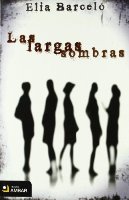 Elia Barceló (Alicante, 1957) estará con nosotros en el Festival ISLA de Literatura los días 2 y 3 de noviembre. Por eso, y para que conozcas un poco mejor su obra, la hemos seleccionado como autora del mes de noviembre en nuestra biblioteca.
Elia Barceló (Alicante, 1957) estará con nosotros en el Festival ISLA de Literatura los días 2 y 3 de noviembre. Por eso, y para que conozcas un poco mejor su obra, la hemos seleccionado como autora del mes de noviembre en nuestra biblioteca.
Elia Barceló reside en Austria desde 1981 donde es profesora de literatura hispánica.
Su campo de investigación es la literatura fantástica, de ciencia ficción y de terror, así como la narrativa argentina y cubana del siglo XX, la novela negra y la literatura juvenil en España. Se la considera una de las escritoras más importantes, en lengua castellana, del género de la ciencia-ficción, junto con la argentina Angélica Gorodischer y la cubana Daína Chaviano. Las tres forman la llamada “trinidad femenina de la ciencia-ficción en Hispanoamérica”.
Ha publicado novelas, ensayo y unos cuarenta relatos. Parte de su obra ha sido traducida al francés, italiano, alemán, catalán, inglés, griego, húngaro, holandés, danés, noruego, sueco y esperanto.
Elia Barceló (Alicante, 1957) is our author of the month in November. She will be with us in the ISLA Literary Festival the 2nd and the 3rd of November, so you have a good chance to know better her literary works.
She lives in Austria since 1981 where she teaches Spanish Literature. Her field of activity is Fantastic Literature, Science Fiction and Horror. She´s also interested in the Argentinian and Cuban narrative of the XX century, crime fiction and books for children and young adults.
She has published novels, essays and over forty short-stories. Part of her work has been translated into French, Italian, German, Catalan, English, Greek, Hungarian, Dutch, Danish, Norgewian and Esperanto.
Audiolibro de la semana | Audiobook of the Week: En primera línea
Emoción para el audiolibro de esta semana: En primera línea escrito por el periodista Baltasar Magro. Para descargarlo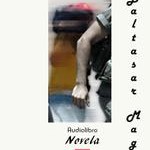 solo necesitas tu carnet de biblioteca y hacer click aquí.
solo necesitas tu carnet de biblioteca y hacer click aquí.
Beirut, 1982. Helena y Luis, dos corresponsales de Televisión Española, y Álex, novato periodista de la agencia EFE, viven de cerca el sitio a los últimos reductos palestinos y la tensión de la guerra del Líbano. Envueltos en la angustiosa atmósfera de la guerra, y en medio de la desolación, surge entre ellos una buena amistad que perdurará con el paso de los años.
La relación entre Luis, Helena y Álex, encuadrada en el mundo real de los medios de comunicación, constituye el eje esencial de esta novela.
El autor de esta trepidante novela perfila un relato intenso para describirnos los secretos de la profesión periodística con una fascinante trama que nos sumerge en los entresijos de la televisión. Baltasar Magro ha trabajado durante más de 30 años en diferentes cadenas como guionista de programas culturales y como director de diferentes espacios informativos, entre los que destaca el mítico Informe Semanal.
An exciting story for the audiobook of the week: En primera línea, written by journalist Baltasar Magro. To download it, just get your library card and press here!
Beirut, 1982. Helena and Luis work as correspondents for the Spanish National Broadcast and Alex is a new journalist working for EFE Press Agency. The three of them live first- hand the siege to the last Palestinian strongholds and the strains due to the war in Lebanon. Involved in the distressing atmosphere of war, a good friendship arises among them in the middle of desolation, lasting through the years.
The relationship between Luis, Helena and Alex, framed in the world of communication media, is the subject matter of this novel. Baltasar Magro outlines an intense story to describe the secrets of Journalism with a fascinating plot that immerses us in the secrets of television.
The author of this exciting novel has been working for over 30 years in different television broadcasters as screenwriter for cultural programmes and director of several news programmes, among which highlights the mythical “Informe Semanal”.
Audiolibro de la semana | Audiobook of the Week: Lo que me queda por vivir
La popular escritora y periodista Elvira Lindo es la autora de la novela Lo que me queda por vivir. Esta semana os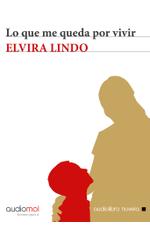 recomendamos que disfrutéis de esta obra a través de nuestro servicio de audiolibros. Si todavía no sabes como utilizarlo verás que es muy fácil, solo necesitas tu carnet de la biblioteca y hacer click aquí.
recomendamos que disfrutéis de esta obra a través de nuestro servicio de audiolibros. Si todavía no sabes como utilizarlo verás que es muy fácil, solo necesitas tu carnet de la biblioteca y hacer click aquí.
Antonia tiene veintiséis años cuando se ve sola con un niño de cuatro en el cambiante Madrid de los ochenta. La suya es la historia de un viaje interior y la crónica de un aprendizaje, el de una mujer que se enfrenta a la juventud y a la maternidad mientras intenta hacerse un lugar en la vida, en una ciudad y en una época de tiempo acelerado, más propicio a la confusión que a la certeza, sobre todo para alguien que ha tenido una experiencia demasiado temprana de la pérdida y de la soledad.
The popular writer and journalist Elvira Lindo is the author of the novel Lo que me queda por vivir. This week we recommend you to enjoy this work through our audiobook downloading service. If you still don´t know how to use it, you can see how easy it is, you just need your library card and make click here.
Antonia is 26 years old when she finds herself with a four year old in a changing Madrid during the 80s. It is the story of an inner journey and the chronicle of a learning process, the one experienced by a woman who faces youth and motherhood while she tries to find her place in life and in a city during fast times. A time more suitable for confusion than for certainty, specially for someone who has lived loss and loneliness too soon.
Audiolibro de la semana | Audiobook of the week: Libro del mal amor
 Esta semana te traemos en forma de audiolibro la primera novela del escritor y periodista peruano Fernando Iwasaki: Libro del mal amor. Para descargarte este audiolibro solamente tienes que tener el carnet en vigor de la biblioteca y hacer click aquí. Así conocerás a su personaje principal de una forma original y divertida: a través de las mujeres que no lo han amado.
Esta semana te traemos en forma de audiolibro la primera novela del escritor y periodista peruano Fernando Iwasaki: Libro del mal amor. Para descargarte este audiolibro solamente tienes que tener el carnet en vigor de la biblioteca y hacer click aquí. Así conocerás a su personaje principal de una forma original y divertida: a través de las mujeres que no lo han amado.
La poco afortunada vida amorosa del protagonista se nos presenta en diez capítulos que llevan el nombre de otras tantas mujeres que le han dado calabazas a lo largo de los años. Experiencias que no sólo tienen un lado negativo pues son asumidas con gran sentido del humor.
A través de esta hilarante crónica de fracasos amorosos, el protagonista, en su afán por perseguir a la mujer de sus sueños se convierte en deportista, patinador, político universitario, vegetariano, judío y experto en ballet. Estas circunstancias lo llevan a vivir insospechadas y sorprendentes situaciones desarrolladas en la década de los 70 y principios de los 80.
This week we bring you a new audiobook, the fist novel of Peruvian writer and journalist Fernando Iwasaki: Libro del mal amor. To download this audiobook you only need to have a valid library card and make click here. You will get to know the main character of the story in an original and funny way: through the women who did not love him.
The unlucky love life of this man is shown in ten chapters named after ten women who rejected him through the years. These experiences don´t have just a negative side as they are received with a great sense of humour.
The protagonist lives a hilarious chronicle of love failures and in his attempt to chase the woman of his dreams he becomes a sports man, skater, politician, university student, vegetarian, Jewish and ballet dancer. These circumstances lead him to live unexpected and surprising experiences during the 70s and early 80s.
